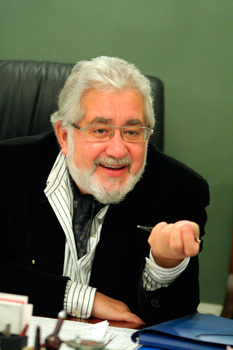
Biography
Born in 1944 in the town of Stalinsk, near Kemerovo, Siberia.He first experienced theatrical production as a child at the Leningrad Young Viewers’ Theatre directed by Matvey Dubrovin, an outstanding teacher and a student of Meyerhold. Graduated from the Leningrad Institute for Theatre, Music and Cinema, where he studied under Boris Sohn, a student of Stanislavsky.
Lev Dodin’s debut as a director was а 1966 teleplay First Love after Turgenev’s story, followed by dozens of theatrical productions, including The Meek One by Dostoyevsky at the Bolshoi Drama Theatre and the Moscow Art Theatre, The Golovlyov Family at the Moscow Art Theatre and It’s a Family Affair at the Leningrad Young People’s Theatre and at the Finnish National Theatre in Helsinki.
His collaboration with the Maly Drama Theater began in 1974 with The Robber by Karel Čapek. The production of The House by Abramov in 1980 sealed the artistic fate of Lev Dodin and the Maly Drama Theater. In 1983 Dodin became the Artistic Director of the theater. In 1985 he directed there a play Brothers and Sisters after Abramov’s trilogy — a production that became the house’s humanistic and artistic manifesto. As a director of the Maly Drama Theatre and a teacher at the Lenigrad Theatre Institute Dodin erased the border between actor’s undergraduate training and professional employment. The Maly Drama Theatre’s legendary productions of The Lord of the Flies, Gaudeamus, The Possessed, A Play Without a Title, King Lear and Life and Fate were a result of a creative union of the experienced members of the company and verdant students. Today the company is almost entirely comprised of Dodin’s former students of several generations, closely connected with their master by a common ideal of a ceaseless artistic quest while working together on the misteries of the great works of literature and the secrets of human nature. Dodin’s recent premieres at the Maly Drama Theatre — Intrigue and Love by Schiller, An Enemy of the People by Ibsen and a new production of The Cherry Orchard — all demostrate that this quest is dear not only to the theatre’s company, but also to the audience, both at home and abroad.
Since the early 1990s Dodin’s Maly Drama Theatre has been actively touring in Russia and worldwide and has performed at all the continents, except the Antarctic. Its productions have been welcomed in more than eighty cities of Europe, Australia, the Americas and Asia, and today they serve as a major representative of the current Russian theatre in the eyes of foreign audience. In September 1998 Dodin’s theatre received the status of Theatre of Europe, the third after the Odeon in Paris and the Piccolo in Milan. Lev Dodin is a member of the General Assembly of the Union of the Theatres of Europe, and in 2012 he was elected the Union’s Honorary President. It is only legitimate that specialists call Dodin’s theatre ‘the most european theatre in Russia and the most russian theatre in Europe’.
Dodin made his first step towards opera directing in 1995, when his friend, the great Claudio Abbado, invited him to direct Strauss’s Elektra at the Salzburg Festival. Since then Dodin’s elaborate choice of opera productions have been graced by matching great composers and outstanding conductors: Strauss’s Elektra in Salzburg, later transferred to Florence; Shostakovich’s Lady Macbeth of Mtsensk in Florence, first with Semyon Bychkov, then with James Conlon; Tchaikovsky’s The Queen of Spades in Amsterdam with Semyon Bychkov; Tchaikovsky’s Mazeppa with Mstislav Rostropovich at La Scala, Milan; Rubinstein’s Demon with Valery Gergiev at the Théâtre du Châtelet, Paris; Verdi’s Otello with Zubin Mehta in Florence; Strauss’s Salome with James Conlon in Paris. Dodin has been constantly returning to The Queen of Spades, co-operating on revisions of his Amsterdam production at the Paris Opera with such remarkable conductors as Vladimir Jurowski, Gennady Rozhdestvensky and Dmitry Jurowski.
All these operas were created in a successful tandem with the great set designer David Borovsky. As an opera director, Dodin is just as demanding upon the singers, the chorus and the supernumeraries as he is upon his own actors: always trying to involve them into exploration of historical background, characters’ stories and the new universe emerging on stage. Many of Dodin’s opera works were born under a happy star of collaboration, companionship and co-creation: in 2014 he produced Mussorgsky’s Khovanshchina at the Vienna State Opera, with orchestra led by Semyon Bychkov, sets and costumes by Alexander Borovsky and light by Damir Ismagilov, the latter two being Dodin’s regular collaborators at the recent Maly Drama Theatre Productions.
Lev Dodin’s achievements in theatre and pedagogy have brought him a lot national and international awards, including the Russian Federation National Award; the USSR State Prize; the 2001 President of Russia Award, Order of Merit for the Fatherland, 3rd and 4th classes; independent award ‘Triumph’; the Stanislavsky Award; the Golden Mask National Theatre Awards; the Laurence Olivier Award, the Franco Abbiati Prize for the best opera production, etc. In 2000 he became the first and by now the only Russian director to receive the prestigious Europe Theatre Prize. Lev Dodin is an honorary member of the Russian Academy of Arts, an officer of the French Ordre des Arts et des Lettres, a winner of the 2012 Platonov Award, an honorary doctor of the Saint Petersburg University of the Humanities. He hold a chair of Directing and is a professor of the Saint Petersburg Theatre Arts Academy.



